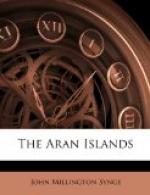Hoping that you are still considering good and pleasant
health since
I got a letter from you before.
I see now that your time is coming round to come to this place to learn your native language. There was a great Feis in this island two weeks ago, and there was a very large attendance from the South island, and not very many from the North.
Two cousins of my own have been in this house for three weeks or beyond it, but now they are gone, and there is a place for you if you wish to come, and you can write before you and we’ll try and manage you as well as we can.
I am at home now for about two months, for the mill was burnt where I was at work. After that I was in Dublin, but I did not get my health in that city.—Mise le mor mheas ort a chara.
Soon after I received this letter I wrote to Michael to say that I was going back to them. This time I chose a day when the steamer went direct to the middle island, and as we came up between the two lines of curaghs that were waiting outside the slip, I saw Michael, dressed once more in his island clothes, rowing in one of them.
He made no sign of recognition, but as soon as they could get alongside he clambered on board and came straight up on the bridge to where I was.
‘Bhfuil tu go maith?’ (’Are you well?’) he said. ’Where is your bag?’
His curagh had got a bad place near the bow of the steamer, so I was slung down from a considerable height on top of some sacks of flour and my own bag, while the curagh swayed and battered itself against the side.
When we were clear I asked Michael if he had got my letter.
‘Ah no,’ he said, ’not a sight of it, but maybe it will come next week.’
Part of the slip had been washed away during the winter, so we had to land to the left of it, among the rocks, taking our turn with the other curaghs that were coming in.
As soon as I was on shore the men crowded round me to bid me welcome, asking me as they shook hands if I had travelled far in the winter, and seen many wonders, ending, as usual, with the inquiry if there was much war at present in the world.
It gave me a thrill of delight to hear their Gaelic blessings, and to see the steamer moving away, leaving me quite alone among them. The day was fine with a clear sky, and the sea was glittering beyond the limestone. Further off a light haze on the cliffs of the larger island, and on the Connaught hills, gave me the illusion that it was still summer.
A little boy was sent off to tell the old woman that I was coming, and we followed slowly, talking and carrying the baggage.
When I had exhausted my news they told me theirs. A power of strangers—four or five—a French priest among them, had been on the island in the summer; the potatoes were bad, but the rye had begun well, till a dry week came and then it had turned into oats.
‘If you didn’t know us so well,’ said the man who was talking, ’you’d think it was a lie we were telling, but the sorrow a lie is in it. It grew straight and well till it was high as your knee, then it turned into oats. Did ever you see the like of that in County Wicklow?’




